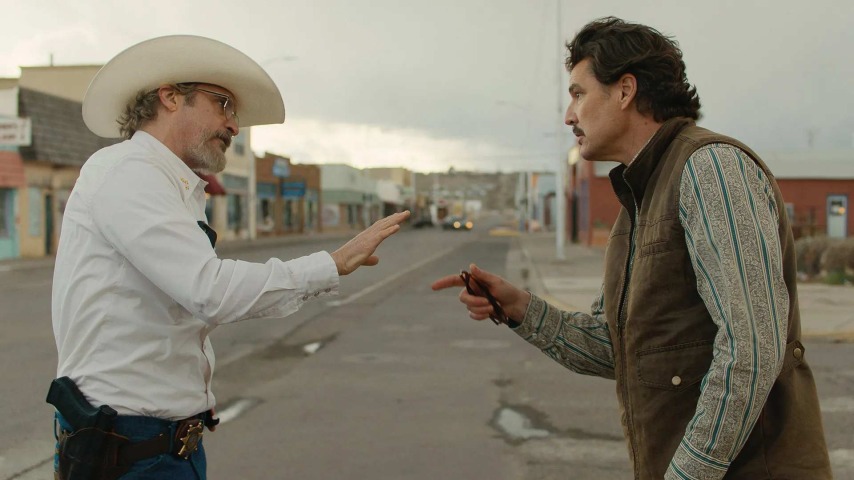As Ari Aster tells it, Eddington has been in the works for a long time. The director originally considered making his feature debut with the film before 2018’s Hereditary took that distinction, but watching the movie, it’s impossible to imagine what that early version might have looked like. Eddington fully immerses itself in the world of George Soros conspiracy theories, mask debates, George Floyd protests, Hillary Clinton body doubles, Bitcoin, AI, and Ma memes. In short, it’s aggressively about a very specific time: the summer of 2020.
If that sounds like a lot for one film to bite off, it is, and Aster doesn’t quite manage to digest it all, even during the film’s expansive 145-minute runtime. Eddington is only a partly coherent mishmash of tones and ideas: sincere and satirical, astute and self-obfuscating. The only thing it is completely is ambitious.
Eddington begins promisingly enough, with Joaquin Phoenix playing Joe Cross, sheriff of the titular New Mexico town over which Pedro Pascal’s Mayor Garcia governs. We meet the two at a Western-style stand-off of sorts, with Joe refusing to enforce or comply with the mayor’s mask mandate. “There’s no COVID-19 in Eddington,” he protests, an it-couldn’t-happen-here attitude that he also adopts in regard to the anti-racist protests that erupt across the country after the murder of George Floyd (which do soon reach Eddington, to his surprise).
Other battle lines are drawn across the dusty streets of the desert town: there are teenage love triangles, border sovereignty disputes, and a quarrel between the “tech-positive” Mayor Garcia and some environmentally concerned local citizens over a corporate proposal to build a “hyperscale data center development” nearby. As sheriff, Joe gets tangled up in all of these conflicts one way or another, but there’s no peace for him at home either. His troubled wife Lou (Emma Stone) has retreated from society and makes surreal, grotesque dolls in their dimly lit bedroom, with the rest of their home being largely surrendered to her conspiracy-obsessed mother Dawn (Deirdre O’Connell).
One would be forgiven for feeling nervous that it’s Aster who’s handling this tinderbox, given that Eddington comes off the back of the Freudian provocation that was Beau Is Afraid. But unlike that movie, Eddington is more interested in exploring division than causing it. Aster takes great pains not to make a white-hat, black-hat movie that reflects already-entrenched culture war lines; he’s clearly much more interested in asking how those lines might have gotten so entrenched in the first place.
His theory is a compelling one. Again and again in the movie, we witness firsthand how narratives are co-opted to serve the diverging agendas of nearly all of Eddington‘s characters, no matter where they sit on the political spectrum. Ideas that characters are initially ideologically opposed to might suddenly become appealing if they can help absolve them of some of their guilt; nuance gets steamrolled by personal grievance or anecdotal experience into blanket, uncompromisable truths; morals slip and warp when it’s more convenient for people to let them.
This point coalesces best around Emma Stone’s Lou. Though she’s clearly still struggling with some traumatic event in her distant past, she’s used as a pawn by everyone around her—even those sworn to protect her. When Joe decides to stand against Garcia in the upcoming election, for example, his beloved “rabbit” Lou’s past becomes a handy weapon to wield against his opponent. Nor does the ostensibly progressive Garcia have any qualms about using Lou in the same manner when it suits him. She similarly finds little protection from her apparent savior (Austin Butler, regrettably underused), a cult leader who draws her and Dawn in with online rants about Pizzagate-esque child predator rings. This is where Eddington is at its shrewdest, when it’s showing the audience how people like Lou and Micheal Ward’s junior cop (the first casualty of the town’s attempts to reckon with George Floyd’s murder) wind up as the collateral damage of other characters’ fickleness, and how that might have led to the current moment of intense polarization.
Clearly aware that, in order to make an effective movie about the dangers of hyperpartisanship, he can’t fall into the same trap, Aster directs some satirical energy at the town’s overzealously progressive white high schoolers. They’re so cripplingly self-aware of their racial privilege that you can virtually see their brains start to smoke as they try to process the contradiction, with one anguished kid leading a vigil screaming, “My job is to sit down and listen, which I plan to do right after making this speech!”
Eddington does have its insightful moments, both wry and sincere, but it’s hampered by the sheer number of plates it tries to spin and all the things it tries to be. The last act offers a Once Upon A Time In Hollywood-style gear-switch into exploitational violence, more than a few impotent attempts at irony, and an inscrutable subplot (Antifa members jetting into Eddington on private planes) in which the film seems to become conspiracy-brained itself.
It’s frustrating to watch the film cloud its own clarity, especially because Eddington is ambitious enough without all this baffling ornamentation. Virtually no other filmmaker with a platform like Aster’s has dared to make audiences relive the fractious era of the film’s setting; that he can do so without triggering pandemic fatigue is a testament to how thought-provoking his film can be. It’s just a shame that it insists on switching focus from the nightmare of our reality to a cryptic, imaginary one of Aster’s own making.
Director: Ari Aster
Writer: Ari Aster
Starring: Joaquin Phoenix, Pedro Pascal, Luke Grimes, Deirdre O’Connell, Micheal Ward, Austin Butler, Emma Stone
Release Date: July 18, 2025
